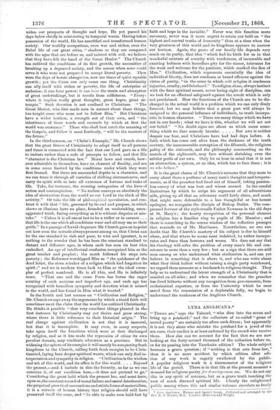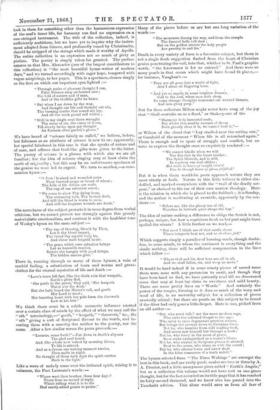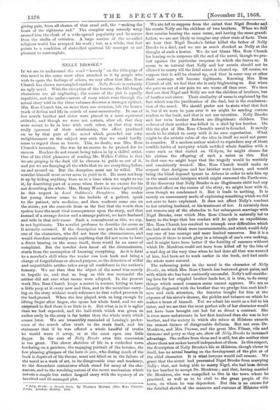LYRA. ANGLICANA.•
" THERE are," says the Talmud, " who dive into the ocean and bring up a potsherd ;" and the collectors of so-called "gems of sacred poetry" are certainly too often such divers; but apparently it is not they alone who mistake the potsherd for a jewel of the sea cave, their verdict is at least endorsed by the crowd who receive them. How else can we account for the fact that .we are now looking at the forty-second thousand of the collection before us, or for its passing into the Tauchnitz edition? The whole subject becomes a grave question ; if " nothing is that errs from law," then it is no mere accident by which edition after edi- tion of any work is eagerly swallowed by the public. A popular religious work is a thermometer of the religious life of the period. There is in that life at the present moment a demand for religious poetry for drawing-room use. We do not say this in any spirit of sarcasm, but as a grave truth touching the root of much diseased spiritual life. Clearly the enlightened public among whom this and similar volumes circulate so freely
• Lyra Anglican. Hymns and Sacred Song?. Collected and arranged by the 1ev. B. H. Baynes, M.A. Loudoli:•Houlbton and Wright. "Through paths of pleasant thought I ran, False Science sang enchanted airs ; She told of nature and of man, And of the Godlike gifts he bears.
"But when I sat down by tho way, And thought out life and thought out sin, The burning truths that round me lay, And all the weak proud self within ; "Still in my single soul there wrought The sense of sin, the curse of doom, Till slowly broke upon my thought An Eastern olive garden's gloom."
We have heard of "science falsely so called," we believe, before, but falseness as an attribute of science is new to us ; apparently, her special falsehood in this case is that she speaks of nature and of man, and affirms that God-like gifts were given to the latter.
The poetry of science is a phrase with which also we are all familiar; but the idea of science singing may at least claim the merit of originality ; but this may be an unfortunate specimen of the genius we were led to expect. We turn to another,—a com- munion hymn :—
" 0 Jesu! bruised and wounded more
Than bursted grape or bread of wheat ; The Life of life within our souls, Tho cup of our salvation sweet;
"We come to show Thy dying hour,
Thy streaming vein, Thy broken flesh, And still the blood is warm to save, And still the fragrant wounds are fresh."
The sacredness of the subject protects it in some degree from verbal criticism, but we cannot protest too strongly against this grossly materialistic emotionalism, and contrast it with the healthier tone of Wesley's hymn on the same subject :—
" The cup of blessing, bless'd by Thee, Let it thy blood impart,
The bread thy mystic body be, And cheer each languid heart.
"The grace which sure salvation brings Let us herewith receive, Satiate the hungry with good things, Tho hidden manna give."
There is, running through so many of these hymns, a vein of morbid feeling, a substitution of tears and worms and grave- clothes for the eternal mysteries of life and death :-
"Love's tears fell fast, like tho thick rain that woopeth,
Earth's glory fled, 'She gooth to the grave,' they said, She keepoth Watch o'er the dead.'
But she hath beard the Master's call, and goeth Her Lord to meet ; Her bursting heart with her pale form she throwoth Low at his feet."
We think there must be a subtle mesmeric influence exerted over a certain class of minds by the effect of what we may call the " eth " terminology,—" goeth," " keepeth," " throweth," &c., the " eth " giving a sort of Scriptural flavour to the words, and in- vesting them with a sanctity due neither to the poetry, nor the sense. After a few similar verses the poem proceeds :—
" Lazarus, come forth!"—Far down in death's abysses
The glad soul heard, And, like a babe now waked by morning kisses, To life is stirred.
And as a dream one waking moment tarries,
Then melts in night, No thought of those dark days the spirit carries Back to the light."
Like a wave of melody come over the irritated spirit, raising it to calmness, the Poet Laureate's words :—
" Where wert thou brother, those four days ?
There lives no record of reply. Which telling what it is to die Had surely added praise to praise."
look in them for something other than the harmonious expression Many of the of the soul's inner life, for harmony can find no expression on a words :- one-stringed instrument. The title of the collection, indeed, is sufficiently ambitious, but we have yet to inquire why the instru- ment adopted from Greece, and professedly tuned by Christianity, should be stripped of the strings which made it worthy of Apollo. The entire collection is an expression not so much of piety as pietism. The poetry is simply taken for granted. The preface assures us that Mrs. Alexander (one of the largest contributors to this collection) is " the most beautiful hymn-writer of modern days," and we turned accordingly with eager hope, tempered with vague misgivings, to her pages. This is a specimen, chosen simply as the first on which our impatient eyes lighted :— pieces before us are but one long variation of the
"The mourners throng the way, and from the steeple The funeral bells toll slow ; But on the golden streets the holy people Aro passing to and fro."
Death in every variety of form is a favourite subject, but there is
not a single fresh suggestion flashed front the heart of Christian genius penetrating the veil, into that, whither in St. Paul's graphic words, " the forerunner is for us entered." And there were so many pearls in that ocean which might have found fit places,— for instance, Vaughan's :—
" They are all gone into a world of light, And I alone sit lingering here.
"And yet as angels, in some brighter dreams, Call to the soul, when man doth sloop, So some strange thoughts transcend our wonted themes, And into glory peep."
But for these collectors Milton might never have sung of the joy that " Shall overtake us as a flood," or Shakespeare of the
"Harmony is in immortal souls, But whilst this muddy vesture of decay
Doth grossly close it in, wo cannot hoar it,"—
or Wilson of the cloud that "Lay cradled near the setting sun," or Gambold of the moment " When life is all retouched again." There is enough and to spare of struggle nud conflict, but no verse to express the thought once so exquisitely rendered :—
" We cannot kindle when wo will
The fire that in the heart resides ; The Spirit blowoth, and is still, In mystery our soul abides ; But tasks in hours of insight rieu;(1, Can be through hours of gloom Milled."
But it is when these would-be poets approach nature they are most utterly at fault. Nature in this little volume is either sin- defiled, and marked everywhere with the " trail of the deadly ser- pent," or chained to the car of their own narrow theology. Here is the relation in which she is placed to the Sabbath ; it is Sunday, and the author is meditating at eventide, apparently by the sea- shore :—
"Before me, like the glassy sea of old, Waveless in Sabbath quiet sleeps the bay."
The idea of nature making a difference to oblige the Scotch is not, perhaps, unique, but how a capricious freak on her part might have spoiled the stanza! A little further on we read,— " But most I think me of that sunlit shore Where tempests beat not, and no shadows full."
Which suggests simply a paradise of burning sands, though doubt- less, to some minds, to whom the sentiment is everything and the simile nothing, there will be sufficient compensation in the lines which follow :-
"Where God and his dear love are all in all,
And wo shall falter, sin, and weep uo more."
It would be hard indeed if in some ninety pieces of sacred verse there were none with any pretension to merit, and though they have been bard to find, we have patiently read till we discovered some that may at least lay claim to sweetness and mild beauty. There are some pretty lines on " Words." And certainly the power of the tongue, forming as it does so much of the warp and woof of life, is no unworthy subject for a collection of pieces avowedly ethical ; but there arc pearls on this subject to be found if the diver had only gone a little deeper. Here is one, picked from an old author :— "But, who must talk ? not the mere modern sage, Who snits the softened Gospel to the age:
Who ne'er to raise degenerate practice strives, But brings the precept down to Christian lives.
Not he, who maxims from cold reading took, And never saw himself but through a book:
Not he, who hasty in the morn of grace, Soon sinks extinguished as a comet's blaze ; Not he, who strains in Scripture phrase to abound, Deaf to the sense, who stuns us with the sound ; But ho, who silence loves, and never dealt In the false commerce of a truth unfelt."
The hymns selected from "The Three Waking" are amongst the best in this book, and are really good; so also are two or three by A. A. Proctor, and a little anonymous piece called " Earth's Angels;" but as a collection this volume would not have cost us one grave thought, but for the fact recorded on its title-page that it has reached its forty-second thousand, and we know also has passed into the Tauchnitz edition. This alone would save us from all fear of
giving pain, from all chance of that cruel evil, the " making the heart of the righteous sad." The compiler may serenely wrap around him the cloak of a wide-spread popularity and be secure from the shafts of criticism. A large section of the so-called religious world has accepted his work ; but, as a whole, that fact points to a condition of shrivelled spiritual life amongst us not pleasant to contemplate.








































 Previous page
Previous page